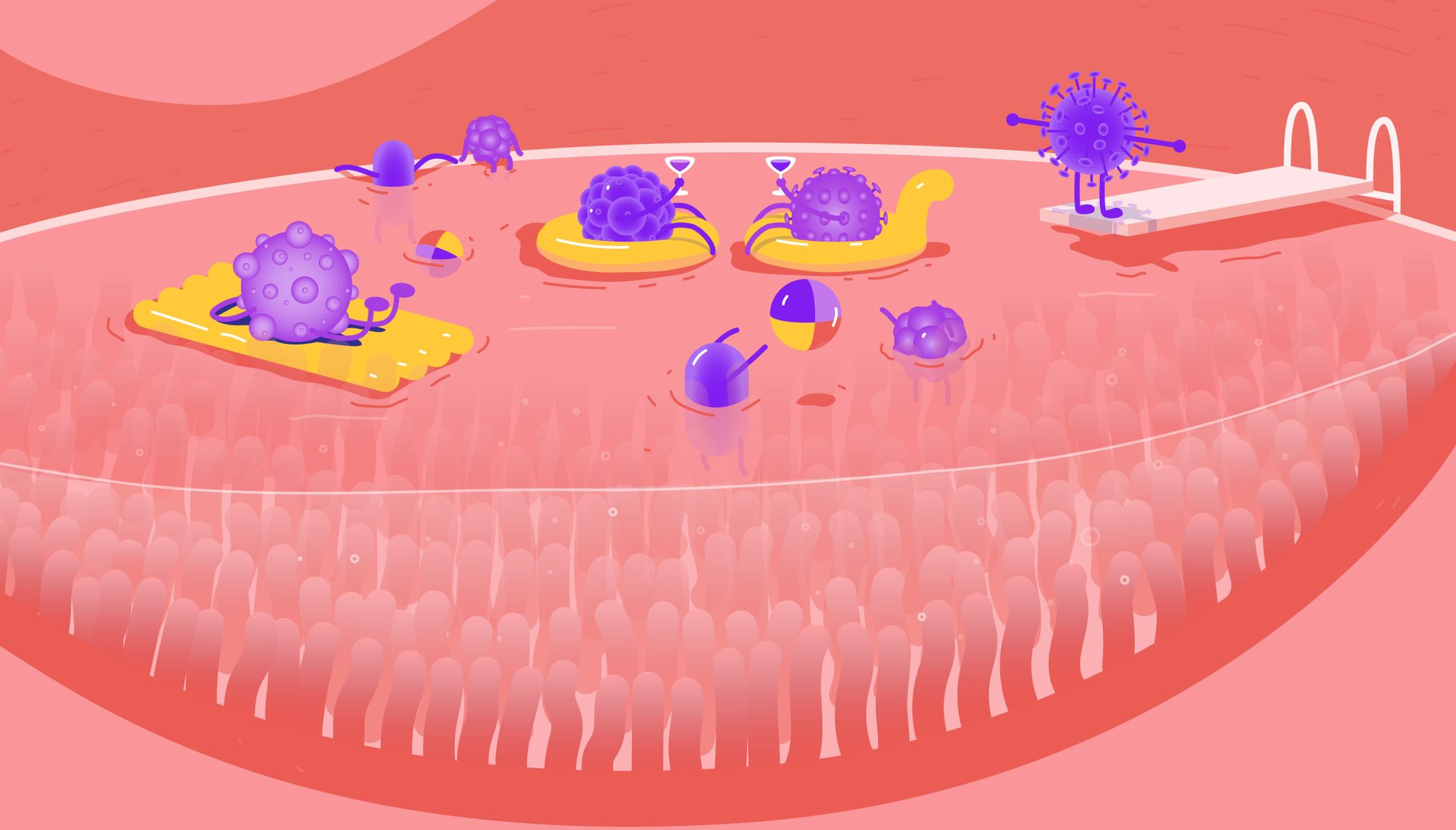Discover how lifestyle, diet, and the gut microbiome can influence your risk of chronic inflammation.
Inflammation is a natural response to a threat. It is necessary to prevent infection, fight illness, and heal damaged tissues. But when this process gets out of control and becomes chronic, inflammation increases risks of preventable diseases.
Chronic inflammation is sterile because it normally begins without an infection, but can persist for decades. To illustrate, last time we reviewed how plaque on the arteries (atherosclerosis) can cause inflammation by confusing the tissues and immune cells.
Now it is time to go further and explore how diet, lifestyle, stress, and gut microbiome health also play a role in chronic disease. Here are some quick links to access the topics in this article that spark your interest.
- How does lifestyle influence chronic stress?
- Chronic inflammation and the gut microbiome
- Use your diet to prevent chronic inflammation
Lifestyle and chronic inflammation
Smoking, physical inactivity, stress, and sleep deprivation facilitate chronic inflammation.
Our daily routines are often chair-bound. Whenever you commute, work at a desk, watch TV, or eat, you are sitting. The person writing this article was also sat at a computer, looking at a screen for hours.
Sit less, do more
But the main problem is not in just sitting, it's the sedentary lifestyle that has become commonplace in developed countries. Inactive people are at higher risk of developing a chronic condition, like coronary heart disease, compared to active individuals.
Growing a beer belly is not the only risk associated with ageing: the immune system also gets overstimulated by damage and cell debris accumulated by our tissues. Scientists coined a new term for this: inflammaging.
However, this relationship is a two-way street. Biological age markers are more pronounced in patients with inflammatory diseases, but an anti-inflammatory lifestyle can slow down the progression of age-related illnesses.
Exercise, it's essential
Regular moderate physical activity over a long period of time can reduce chronic inflammation and disease risks. Research also shows that exercise can be effective for patients with type 2 diabetes, heart disease, and depression - all of which include a component of chronic inflammation.
Tumour Necrosis Factor 𝛂 (TNF𝛂) is a pro-inflammatory chemical secreted during inflammation that activates a number of immune cell types. TNF𝛂 can cause insulin resistance. It also stimulates the production of C-reactive protein in the liver.
C-reactive protein (CRP) is an inflammation-associated protein, and elevated CRP levels are associated with increased risk of heart disease and type II diabetes. Doctors often include a CRP blood test for complex health problems because it’s a marker of chronic inflammation.
Manage stress levels
If an inactive lifestyle is the first horseman of inflammation, the second is chronic stress. Not all stress is negative, but things like persistent work overload, toxic relationships, arguments, and financial difficulties can take their toll.
Chronic stress contributes to atherosclerosis progression and makes people vulnerable to mental health issues. It also increases type II diabetes risk, especially in obese individuals. Fortunately, there are several ways to combat chronic stress.
Focus on the quality and quantity of your sleep (7–9 hours per night) - it's an essential process that repairs the body. It's also when your brain gets rid of the debris from activities during the day.
Finding time for yourself, a relaxing hobby, breathing exercises, and building a reliable social network of caring friends and family are also important. These positive interactions and activities help the nervous system to unwind from negative stimuli that cause stress.
Drop the booze and fags
Not all de-stressing is good. Smoking just one cigarette a day increases the risk of coronary heart disease, stroke, and several cancers. Excessive alcohol consumption also boosts cancer risks and contributes to psychiatric and digestive diseases.
☝️REMEMBER☝️Giving up smoking and alcohol is hard and can have side effects for your body. Always consult your doctor before making important changes to your lifestyle.
Your microbiome and chronic inflammation
Gut microbiome health is reflected in many processes in our bodies, including chronic inflammation and associated disease risks.
The gut microbiome is an ecosystem of bacteria that live in your large intestine. It's not only important for your physical health, but your mental wellbeing too.
Gut microbes and stress
Negative alterations in the composition of the gut microbiome, also known as dysbiosis, has been shown to make mice more anxious. They've also shown that chronic stress can reduce levels of important probiotic bacteria called Lactobacillus.
Studies in humans indicate that probiotic bacteria can help alleviate depression, increase stress resilience, and relieve anxiety. Researchers suggest that it's because gut bacteria influence our levels of mood chemicals like serotonin and Gamma-Aminobutyric Acid (GABA).
Butyrate combats inflammation
Multiple aspects of our health depend on molecules produced by the gut microbiome, and the human body simply cannot make them, but our bacteria can. The main question is whether having this supply is good or bad for us.
First of all, it helps to maintain the integrity of our digestive tract and supplies most of the fuel for the cells of our gut lining. By doing so, it bolsters this barrier and helps prevent metabolites, food particles, and unwanted bacteria from crossing into the body from the intestines.
Low butyrate production and below-average levels of butyrate-producing bacteria are found in many inflammatory and metabolic diseases, including Crohn's disease and ulcerative colitis.
Butyrate also helps modulate the immune system by reducing the production of TNF𝛂 and IL-6, while promoting anti-inflammatory signalling. By doing so, this chemical promotes healthy and balanced microbiota, and even protects against colon cancer.
Amino acids and insulin resistance
On the opposite side of the spectrum, we have branched-chain amino acids (BCAA). This is another molecule that can't be synthesised by the human body. Two bacterial species, Prevotella copri and Bacteroides vulgatus, drive BCAA biosynthesis in disease scenarios.
Branched-chain amino acids are used to make proteins, the complex molecular machines responsible for most processes in our bodies. BCAAs can be used as an energy source, modulating the production of signalling molecules in the brain and stimulating the uptake of sugar from blood.
Branched-chain amino acids and butyrate are just two examples of numerous pro- and anti-inflammatory molecules that can be produced by the gut microbiome. While these activities are important, it's essential to look at the whole microbiome to understand how it can influence your health.
☝Discover your gut microbiome☝with the Atlas Microbiome Test. See your butyrate and probiotic levels bacteria, disease protection status, and get food recommendations to enhance your gut microbial health.
Your diet and chronic inflammation
Chronic inflammation is influenced by what we eat: diet has a strong impact on the microbiome and preventable disease risks.
Dietary fibre enables beneficial bacteria to produce butyrate, which is important to keep our gut healthy. But that’s not the only way your food choices affect chronic inflammation.
Researchers developed the Dietary Inflammatory Index (DII) to indicate how anti- or pro-inflammatory a person’s diet is. According to studies, the Standard American Diet (SAD) has a particularly high inflammatory index.
SAD is often contrasted with a healthy eating pattern, filled with plenty of fruits, vegetables, and whole grains and legumes, as well as healthy fats like olive oil. Such foods have a much lower inflammatory index.
There is compelling scientific evidence from a cohort of older French adults (around 80 years old) that high adherence to the Mediterranean diet means lower chances of frailty in later life.
On the other hand, eating a pro-inflammatory diet is associated with a higher risk of heart attack. People following eating patterns with high dietary inflammatory index are also more susceptible to weight gain and obesity, as well as type II diabetes.
Eating habits are an important influence on our chronic inflammation levels. Your body will thank you for a balanced and diverse diet with a variety of whole, plant-based foods, fruit, and vegetables.
☝Be food smart☝If you decide to change your diet, always consult your GP first, especially if you have an underlying health condition.
Takeaways:
- Chronic inflammation can cause and accelerate many diseases.
- The gut microbiome has an impact on chronic preventable disease risks.
- Your lifestyle and diet choices can reduce chronic inflammation levels.
- Pro-inflammatory choices include sedentary lifestyle, obesity, smoking, high-stress living, sleep deprivation, and excessive alcohol intake.
- Anti-inflammatory habits include regular physical activity, stress management, and a diverse diet with a variety of whole plant-based foods.
- [Arner, P., Bernard, S., Appelsved, L., Fu, K.-Y., Andersson, D. P., Salehpour, M., … Spalding, K. L. (2019). Adipose lipid turnover and long-term changes in body weight. Nature Medicine, 25(9), 1385–1389.] (https://doi.org/10.1038/s41591-019-0565-5)
- [Bedford, A., & Gong, J. (2018). Implications of butyrate and its derivatives for gut health and animal production. Animal Nutrition (Zhongguo Xu Mu Shou Yi Xue Hui), 4(2), 151–159.] (https://doi.org/10.1016/j.aninu.2017.08.010)
- [Chong, C. Y. L., Bloomfield, F. H., & O’Sullivan, J. M. (2018). Factors Affecting Gastrointestinal Microbiome Development in Neonates. Nutrients, 10(3), 274.] (https://doi.org/10.3390/nu10030274)
- [Dhabhar, F. S. (2014). Effects of stress on immune function: the good, the bad, and the beautiful. Immunologic Research, 58(2), 193–210.] (https://doi.org/10.1007/s12026-014-8517-0)
- [Dimitrov, S., Hulteng, E., & Hong, S. (2017). Inflammation and exercise: Inhibition of monocytic intracellular TNF production by acute exercise via β2-adrenergic activation. Brain, Behavior, and Immunity, 61, 60–68.] (https://doi.org/10.1016/J.BBI.2016.12.017)
- [Esmaillzadeh, A., Kimiagar, M., Mehrabi, Y., Azadbakht, L., Hu, F. B., & Willett, W. C. (2007). Dietary Patterns and Markers of Systemic Inflammation among Iranian Women. The Journal of Nutrition, 137(4), 992–998.] (https://doi.org/10.1093/jn/137.4.992)
- [Foster, J. A., Rinaman, L., & Cryan, J. F. (2017). Stress & the gut-brain axis: Regulation by the microbiome. Neurobiology of Stress, 7, 124–136.] (https://doi.org/10.1016/J.YNSTR.2017.03.00)
- [Franceschi, C., Garagnani, P., Parini, P., Giuliani, C., & Santoro, A. (2018). Inflammaging: a new immune–metabolic viewpoint for age-related diseases. Nature Reviews Endocrinology, 14(10), 576–590.] (https://doi.org/10.1038/s41574-018-0059-4)
- [Gleeson, M., Bishop, N. C., Stensel, D. J., Lindley, M. R., Mastana, S. S., & Nimmo, M. A. (2011). The anti-inflammatory effects of exercise: mechanisms and implications for the prevention and treatment of disease. Nature Reviews Immunology, 11, 607.] (https://doi.org/10.1038/nri3041)
- [González, K., Fuentes, J., & Márquez, J. L. (2017). Physical Inactivity, Sedentary Behavior and Chronic Diseases. Korean Journal of Family Medicine, 38(3), 111–115.] (https://doi.org/10.4082/kjfm.2017.38.3.111)
- [Hackshaw, A., Morris, J. K., Boniface, S., Tang, J.-L., & Milenković, D. (2018). Low cigarette consumption and risk of coronary heart disease and stroke: meta-analysis of 141 cohort studies in 55 study reports. BMJ (Clinical Research Ed.), 360, j5855–j5855.] (https://doi.org/10.1136/bmj.j5855)
- [Holeček, M. (2018). Branched-chain amino acids in health and disease: metabolism, alterations in blood plasma, and as supplements. Nutrition & Metabolism, 15, 33.] (https://doi.org/10.1186/s12986-018-0271-1)
- [Jacob, L., Freyn, M., Kalder, M., Dinas, K., & Kostev, K. (2018). Impact of tobacco smoking on the risk of developing 25 different cancers in the UK: a retrospective study of 422,010 patients followed for up to 30 years. Oncotarget, 9(25), 17420–17429.] (https://doi.org/10.18632/oncotarget.24724)
- [Kim, H. S., Sohn, C., Kwon, M., Na, W., Shivappa, N., Hébert, J. R., & Kim, M. K. (2018). Positive Association between Dietary Inflammatory Index and the Risk of Osteoporosis: Results from the KoGES_Health Examinee (HEXA) Cohort Study. Nutrients, 10(12), 1999.] (https://doi.org/10.3390/nu10121999)
- [Mattusch, F., Dufaux, B., Heine, O., Mertens, I., & Rost, R. (200AD). Reduction of the Plasma Concentration of C-Reactive Protein Following Nine Months of Endurance Training. International Journal of Sports Medicine, 21(1), 21–24.] (https://www.thieme-connect.com/products/ejournals/abstract/10.1055/s-2000-8852)
- [Pedersen, H. K., Gudmundsdottir, V., Nielsen, H. B., Hyotylainen, T., Nielsen, T., Jensen, B. A. H., … Pedersen, O. (2016). Human gut microbes impact host serum metabolome and insulin sensitivity. Nature, 535, 376.] (https://doi.org/10.1038/nature18646)
- [Petersen, A., & Pedersen, B. (2006). The role of IL-6 in mediating the anti-inflammatory effects of exercise. Journal of Physiology and Pharmacology, 57(Suppl. 10), 43–51.] (http://jpp.krakow.pl/journal/archive/11_06_s10/pdf/43_11_06_s10_article.pdf)
- [Phillips, C. M., Chen, L.-W., Heude, B., Bernard, J. Y., Harvey, N. C., Duijts, L., … Hébert, J. R. (2019). Dietary Inflammatory Index and Non-Communicable Disease Risk: A Narrative Review. Nutrients, 11(8), 1873.] (https://doi.org/10.3390/nu11081873)
- [Rahi, B., Ajana, S., Tabue-Teguo, M., Dartigues, J.-F., Peres, K., & Feart, C. (2018). High adherence to a Mediterranean diet and lower risk of frailty among French older adults community-dwellers: Results from the Three-City-Bordeaux Study. Clinical Nutrition, 37(4), 1293–1298.] (https://doi.org/10.1016/j.clnu.2017.05.020)
- [Salleh, M. R. (2008). Life event, stress and illness. The Malaysian Journal of Medical Sciences : MJMS, 15(4), 9–18.] (https://www.ncbi.nlm.nih.gov/pubmed/22589633)
- [Shield, K. D., Parry, C., & Rehm, J. (2013). Chronic diseases and conditions related to alcohol use. Alcohol Research : Current Reviews, 35(2), 155–173.] (https://www.ncbi.nlm.nih.gov/pubmed/24881324)
- [Shivappa, N., Godos, J., Hébert, J. R., Wirth, M. D., Piuri, G., Speciani, A. F., & Grosso, G. (2018). Dietary Inflammatory Index and Cardiovascular Risk and Mortality-A Meta-Analysis. Nutrients, 10(2), 200.] (https://doi.org/10.3390/nu10020200)
- [Shivappa, N., Hebert, J. R., Neshatbini Tehrani, A., Bayzai, B., Naja, F., & Rashidkhani, B. (2018). A Pro-Inflammatory Diet Is Associated With an Increased Odds of Depression Symptoms Among Iranian Female Adolescents: A Cross-Sectional Study. Frontiers in Psychiatry, 9, 400.] (https://doi.org/10.3389/fpsyt.2018.00400)
- [Shivappa, N., Steck, S. E., Hurley, T. G., Hussey, J. R., & Hébert, J. R. (2014). Designing and developing a literature-derived, population-based dietary inflammatory index. Public Health Nutrition, 17(8), 1689–1696.] (https://doi.org/10.1017/S1368980013002115)
- [Zeng, H., Lazarova, D. L., & Bordonaro, M. (2014). Mechanisms linking dietary fiber, gut microbiota and colon cancer prevention. World Journal of Gastrointestinal Oncology, 6(2), 41–51.] (https://doi.org/10.4251/wjgo.v6.i2.41)

























